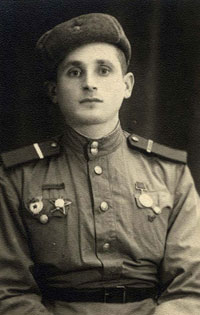Leizer Shneer was born in Abrene (Latvia, today – Pytalovo, Russia). His father was a rabbi and he received a traditional Jewish religious education, first studying in a heder.
In the first weeks of Nazi Germany's invasion of the Soviet Union that began on June 22, 1941, Shneer's family succeeded in fleeing to the Soviet interior, reaching Uzbekistan. In September 1942 Leizer was drafted and apparently sent for training as a sapper. In April 1943, with the rank of corporal, he was a member of the 43rd Latvian Division, in which 17% of its personnel were Jews when it was first formed as the 201st Latvian Division (it was reorganized in October 1942). For carrying out his duties as sapper with diligence and his participation in military intelligence activities, in 1944 Shneer was awarded the Medal for Combat Merit and the Order of the Red Star. He was seriously wounded while fighting in Latvia. He ended the war in the western part of Latvia, participating in the liquidation of the Courland Pocket, in which German forces resisted the Red Army right until the capitulation of Nazi Germany.
After the war Shneer lived in Riga, where he was employed in the state trade sector. He immigrated to Israel in the early 1970s and settled in Jerusalem. There he was head of the Jerusalem branch of the veterans of World War II.
He died in Jerusalem in 2009.
Memoir of Leizer Shneer
In an interview in 1995 Leizer Shneer recalled the relatively tolerant atmosphere in the Latvian Division during the war:
"It happened in the 43rd [Division]. I returned from scouting the Germans. We had captured a "tongue" [an enemy soldier who could reveal something to us] and I was falling off my feet, but the political officer called for me. When I reported, I took a look: he was holding my tefillin in his hands. He had peeked into my bag when I was out scouting.
'What is this?' he asked.
I remain silent, trying to figure out what to say. He continued:
'I can guess what this is. I used to live among Jews. Do you believe in God?'
I didn't know how to answer: I was afraid to say 'yes,' but I didn't want to lie and say 'No,' either.
I replied: 'My mother gave them to me. I carry them as a talisman.'
He looked at me. 'O.k., take them but don't show them to anyone!'"
From: Aron Shneer, Plen (POWs), Jerusalem, 2003, vol. 2, p. 67.







